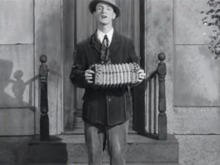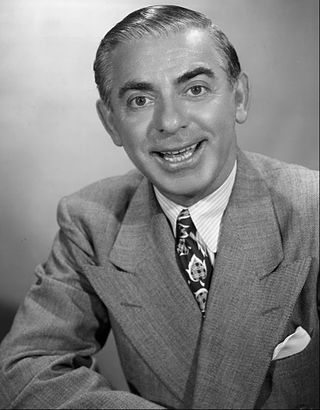
Eddie Cantor was an American comedian, actor, dancer, singer, songwriter, film producer, screenwriter and author. Cantor was one of the prominent entertainers of his era.

William Clement Frawley was an American Vaudevillian and actor best known for playing landlord Fred Mertz in the sitcom I Love Lucy. Frawley also played "Bub" O'Casey during the first five seasons of the sitcom My Three Sons and the political advisor to the Hon. Henry X. Harper in the film Miracle on 34th Street.
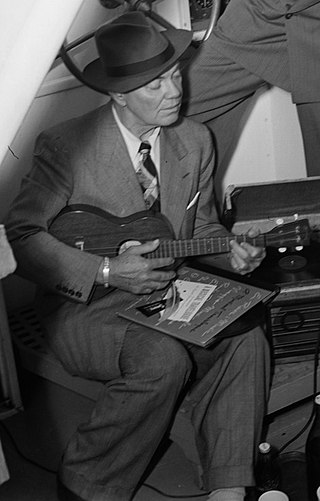
Clifton Avon "Cliff" Edwards, nicknamed "Ukulele Ike", was an American musician and actor. He enjoyed considerable popularity in the 1920s and early 1930s, specializing in jazzy renditions of pop standards and novelty tunes. He had a number one hit with "Singin' in the Rain" in 1929. He also did voices for animated cartoons later in his career, and he is best known as the voice of Jiminy Cricket in Walt Disney's Pinocchio (1940) and Fun and Fancy Free (1947), and Dandy (Jim) Crow in Walt Disney's Dumbo (1941).

Arthur Veary Treacher was an English film and stage actor active from the 1920s to the 1960s, and known for playing English types, especially butler and manservant roles, such as the P.G. Wodehouse valet character Jeeves and the kind butlers opposite Shirley Temple in Curly Top (1935) and Heidi (1937). In the 1960s, he became well known on American television as an announcer/sidekick to talk show host Merv Griffin, and as the support character Constable Jones in Disney's Mary Poppins (1964). He lent his name to the Arthur Treacher's Fish and Chips chain of restaurants.

Dean Jagger was an American film, stage, and television actor who won the Academy Award for Best Supporting Actor for his role in Henry King's Twelve O'Clock High (1949).

Lester Alvin Burnett, better known as Smiley Burnette, was an American country music performer and a comedic actor in Western films and on radio and TV, playing sidekick to Gene Autry, Roy Rogers, and other B-movie cowboys. He was also a prolific singer-songwriter who is reported to have played proficiently over 100 musical instruments, sometimes more than one simultaneously. His career, beginning in 1934, spanned four decades, including a regular role on CBS-TV's Petticoat Junction in the 1960s.

Lionel Alfred William Atwill was an English stage and screen actor. He began his acting career at the Garrick Theatre. After coming to the U.S., he subsequently appeared in various Broadway plays and Hollywood films. Some of his more significant roles were in Captain Blood (1935), Son of Frankenstein (1939) and To Be or Not to Be (1942).
Harry Akst was an American songwriter, who started out his career as a pianist in vaudeville accompanying singers such as Nora Bayes, Frank Fay and Al Jolson.

Peter Lind Hayes was an American vaudeville entertainer and film and television actor.
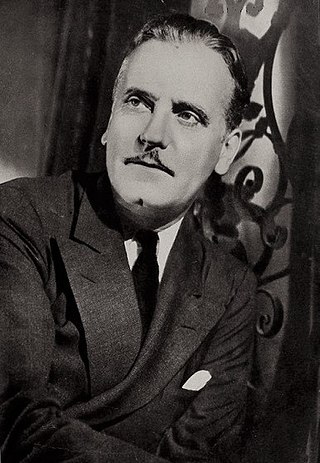
Raphael Kuhner Wuppermann, known professionally as Ralph Morgan, was a Hollywood stage and film character actor, and union activist. He was a brother of actor Frank Morgan as well as the father of actress Claudia Morgan.

Ian Hunter was a Cape Colony-born British actor of stage, film and television.

Tyler Brooke was an American film actor. He appeared in more than 90 films between 1915 and 1943. He was born in New York, New York and died in Los Angeles, California by committing suicide by carbon monoxide poisoning.
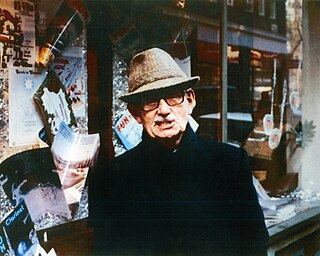
Thomas Patrick Connor was a British lyricist and songwriter, credited with several hit songs over his long career. He wrote several of the most popular non-religious Christmas songs, including "The Little Boy that Santa Claus Forgot", "I'm Sending a Letter to Santa Claus", and "I Saw Mommy Kissing Santa Claus", as well as the lyrics for such popular songs as "Lili Marlene" and "The Biggest Aspidistra in the World".

Esther Dale was an American actress of the stage and screen.

Bobby Watson was an American theater and film actor, playing a variety of character roles, including, after 1942, Adolf Hitler.

Bernadene Hayes was an American film and television actress. She also performed on radio and the stage, and as a singer.

Adrian Michael Morris was an American actor of stage and film, and a younger brother of Chester Morris.

Patricia Bowman was an American ballerina, ballroom dancer, musical theatre actress, television personality, and dance teacher.
Ronald Graham was a Scottish born actor and singer who had a career performing in American radio, film, and theater from the early 1930s until his death in 1950. After winning a national singing competition, he became a regular performer on the radio program Blue Monday Jamboree from 1931 to 1935. He is best remembered for his many appearances in Broadway musicals from 1937 to 1944; notably creating roles in the original productions of works by Richard Rodgers, Lorenz Hart, Cole Porter, and Arthur Schwartz.

Sylvia Froos, sometimes spelled as Sylvia Fross, was an American actress and singer who appeared on stage, radio, recordings, television, and film during the 1920s through the 1940s. She was a child star that was sometimes billed as Baby Sylvia and as the "Little Princess of Song" and in the UK as "America's Queen of Song". She was also referred to as "The Miniature Belle Baker", with her ability to mimic the vocal performances of celebrities being particularly noted by the media, and was additionally likened to Sophie Tucker and Marion Harris.
